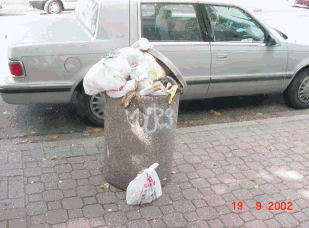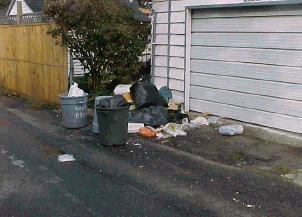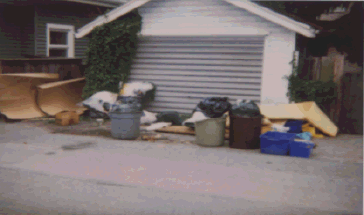

 |

|
POLICY REPORT
OTHER
Date: October 10, 2001
Author/Tel: Kevin.VanVliet
604-873-7992
RTS No. 02345
CC File No. 3756
CS&B: October 18, 2001
TO:
Standing Committee on City Services and Budgets
FROM:
General Manager of Engineering Services
SUBJECT:
Changes to Allocation of Garbage Service
RECOMMENDATION
A. THAT commencing January 1, 2002 mandatory residential garbage collection service be assigned on a per dwelling unit basis as outlined in this report to all residential properties not receiving collection via commercial container.
B. THAT future garbage collection fees be determined by the addition of a single service fee plus a unit rate per can of garbage as outlined in this report.
C. THAT the Director of Legal Services make the necessary amendments to Bylaw No. 7832 to incorporate the changes to the solid waste collection system as outlined in this report and approved by Council.
GENERAL MANAGER OF ENGINEERING'S COMMENTS
The General Manager of Engineering Services notes that most of the complaints with the previously approved system of billing were from some owners who were required to take service (extra cans) that they did not need or want to pay for. It is acknowledged that it is difficult to design a system that meets the needs of all types of dwelling units. Nonetheless, a modified system is proposed which reduces the basic unit of service per dwelling unit and significantly reduces the cost while maintaining equity between the various users. This should address most of the complaints and as a result A through C are recommended.
POLICY
On May 3, 1994 Council agreed to support the Greater Vancouver Solid Waste Management Plan, which includes using user pay for Solid Waste programs.
On October 7, 1997, Council approved the implementation of the Solid Waste Utility effective January 1, 1998.
On December 3, 1998 Council approved a reduction in the refuse "can limit" to 2 cans per Basic Customer Unit effective February 1, 1999.
On December 14, 2000, Council approved changes to the allocation of garbage service effective January 1, 2002.
SUMMARY
Council approved changes to the allocation of garbage collection services on December 14, 2000 for implementation January 1, 2002. The changes included allocating garbage service to all residential properties based on the number of dwelling units existing at each property. The change in allocation was to address the following issues:
· Inappropriate disposal of household garbage in public litter containers,
· Abandoned household garbage in lanes and on public property,
· Excess garbage accumulating in lanes due to reluctance to pay for additional service,
· Inadequate service provided to larger, multi-family properties.Staff have been working to implement approved changes since February. On September 17, 2001 a letter was sent to approximately 4,000 properties affected by the change in service.
Based on discussions with property owners affected by the change Engineering Services is recommending that the allocation of garbage service and the fee structure for garbage collection be modified in an effort to better meet the needs of our users and at the same time continue to meet the City's needs of addressing inappropriate garbage disposal.
It is recommended that commencing January 1, 2002 mandatory residential garbage collection service be assigned on a per dwelling unit basis to all residential properties not receiving collection via commercial container. Properties with one or two dwelling units would continue to receive two cans of service. Properties with more than two dwelling units would receive an additional can for every pair of dwelling units above 2.
It is also recommended that future garbage collection fees be determined by the addition of a single service fee plus a unit rate per can of garbage. Using the 2001 fees as a guide, the recommended fee structure would consist of a $35 Service Fee plus $30 for each can of garbage service received. Properties with one or two dwelling units would see no change in either their allocation or fee.
The allocation levels and impacts will be monitored annually to ensure that the City continues to allocate the appropriate number of cans in future years.
PURPOSE
The purpose of this report is to update Council on the implementation of previously approved changes to the allocation of garbage collection service and to seek Council's approval on modifications to garbage service allocation as well as the garbage service fee structure based on feedback from affected property owners.
BACKGROUND
The City's existing garbage program allocates two cans of garbage to single family and "original single family" properties or "conversion dwellings", regardless of how many dwelling units or residents reside therein. Strata apartments receive four cans of service, and rental apartments are not allocated any mandatory service.
Problems being addressed
As part of a comprehensive review of the City's street cleaning program in 2000, it was identified that the amount of household garbage being improperly disposed of is straining our street cleaning and abandoned garbage budgets. A survey of street litter cans in 2000 identified that 30-35% (by weight) of the garbage collected from litter cans is household garbage. Some street litter containers contain over 80% household garbage. Anecdotal evidence from Parks and Recreation indicates a similar problem with litter containers in parks.
The results of a MarkTrend telephone survey conducted in 2000 on behalf of Engineering Services indicate that residents of multi-family properties are having a difficult time with our garbage disposal limits. The survey reported that residents who are most critical of the current two can limit include those in "... houses that have three or more dwelling units and those with large households (five or more people)".
While properties are expected to purchase the extra level of garbage service that they require, this does not always happen. Appendix 1 shows that in 2000, most of the conversion houses with between three and ten dwelling units only received service for two cans of garbage. Many of these properties rely on their tenants to determine how to dispose of their garbage. There is often confusion or conflict between tenant and landlord as to who is responsible for paying for garbage service above two cans. As a result, many tenants, in the absence of landlord provided service, will find a convenient commercial garbage container owned by other property owners, street litter container, or illegally dump their household waste.
In addition to properties that are under serviced, staff occasionally discover a residential property that has no apparent garbage service at all. Under the existing bylaw, there is no method of forcing certain properties to purchase garbage collection service.
Actions
To address the fundamental issue of inappropriate household garbage disposal described above, Engineering Services proposed a number of changes to the allocation of garbage service to all residential properties. The changes based City garbage service allocation on the number of dwelling units at all residential properties. Most of the properties affected by these changes are "conversion houses" or "original single family" homes with three or more dwelling units. Fees continued to be based on the average cost per can. These changes were approved at the Standing Committee on City Services and Budgets on December 14, 2000. A copy of the relevant sections of that report is included as Appendix 2.
DISCUSSION
Staff began implementing the changes previously approved by Council in February of this year. To date we have accomplished the following:
1. Developed a dwelling unit count for those multi-suite properties for which no previous count had been verified.
2. Began attaching garbage labels, indicating the number of cans of service, to properties that are being removed from the can account system of billing.
3. Notified approximately 4,000 properties of the impending change and approximate cost implication, as well as asked for confirmation of our dwelling unit count prior to proceeding with billing in June 2002.Item #3 was accomplished with a mailout on September 17, 2001. It was anticipated that labeling of properties could begin mid October once dwelling unit counts were verified.
There has been a significant response to the September 17 mailout. Engineering Services has responded to between 150 and 200 enquiries (mainly complaints). Most of the complaints focus on the additional service, which landlords or property managers feel that they do not need, or do not want to pay for. Some of the respondents confirmed that the allocations were appropriate.
Some of the complaints focus on an incorrect dwelling unit count, although it was our goal to receive feedback on this issue to ensure that billing information is correct by providing a form letter for response.
A copy of the letter is included as Appendix 3.
Based on the feedback received over the last four weeks we feel that some further modifications can be made to our garbage program while retaining our ability to address the concerns around inappropriate garbage disposal.
Garbage Can Allocation
The approved change in allocation of garbage service required that one can of garbage be allocated for each dwelling unit at a property with five or fewer units. For properties with more than five units, additional cans are allocated for every pair of dwelling units above five to allow for larger fluctuations in garbage requirements observed at larger properties. A dwelling unit is defined in the Solid Waste and recycling Bylaw as "each unit of living accommodation which, if theproperty were a Strata, would likely be a Strata lot".
The table of garbage allocation that was approved was developed using field observations and a comparison to single family allocation. It is acknowledged that some uncertainty remains as to exactly how much garbage a multi-family dwelling unit would generate, on average. The generation rate is dependent on the number of people in a suite, as well as their lifestyle.
Based on feedback and discussions with various property owners over the last month Engineering Services recommends that Council approve a modified allocation table that provides fewer cans of service, depending on the number of units. The proposed allocation should still address the problems of inappropriate garbage disposal that originated the proposed changes, but at a more conservative and less costly level. Set out rates will continue to be monitored over the next few years, measuring the appropriateness of the allocation as well as the impact on abandoned garbage and litter container programs.
A comparison summary can be found in Table 1.
Fee Structure
The fee structure for garbage service is a concern expressed by owners of multi-unit properties. In order to address this concern, an alternate fee structure is proposed that would move away from charging for each can of garbage based on its average cost, to a system that would be similar to that used for recycling. Garbage fees would be the sum of a base "service" fee plus a fee for each can of garbage service received (whether allocated or voluntarily purchased). The fee per can will be closer to the marginal cost of each can.
The 2002 fees will not be set until November 20. Using the 2001 fees as a guide, the recommended fee structure would consist of a $35 Service Fee plus $30 for each can of service received. This new fee structure has the following benefits:
1. lower cost for each additional can, either allocated or purchased, reducing the disincentive to pay for additional service when required,
2. lower cost paid by those properties that may not fully utilize the service,
3. maintains the user pay principle as required in the Solid Waste Management Plan,
4. acknowledges benefits of increased residential density,
5. increases equity in paying for the garbage collection program between single family and multi-family properties.When compared to the December 2000 approved changes to garbage allocation, the proposed changes in this report reduce the allocation of service to multi-family properties as well as reduce the financial impact of the allocation in response to feedback from owners of multi-family properties. A comparison of the previously approved allocation and the proposed allocation and approximate fees are presented in Table 1 below:
Table 1. Comparison of Garbage allocation and fees*
# Units
Current
Previously Approved
Proposed
# Properties
Allocation
Fee
Allocation
Fee
Allocation
Fee
Affected
1 - 2
2
$95.00
2
$95.00
2
$95.00
82,000
3
2
$95.00
3
$142.50
3
$125.00
2600
4
2
$95.00
4
$190.00
3
$125.00
900
5
2
$95.00
5
$237.50
4
$155.00
270
6
2
$95.00
6
$285.00
4
$155.00
180
7
2
$95.00
6
$285.00
5
$185.00
70
8
2
$95.00
7
$332.50
5
$185.00
65
9
2
$95.00
7
$332.50
6
$215.00
19
10
2
$95.00
8
$380.00
6
$215.00
16
11
2
$95.00
8
$380.00
7
$245.00
21
12
2
$95.00
9
$427.50
7
$245.00
18
13
2
$95.00
9
$427.50
8
$275.00
8
14
2
$95.00
10
$475.00
8
$275.00
0
15
2
$95.00
10
$475.00
9
$305.00
2
* Proposed fee based on 2001 fees. 2002 fees will be presented to Council for approval in late November 2001.
ENVIRONMENTAL IMPLICATIONS
It is expected that the allocation of garbage collection services on a per dwelling unit basis will reduce the amount of household garbage finding its way to City litter containers, commercial garbage containers, and abandoned in lanes across the City. A reduction in the amount of garbage in our existing litter containers may allow us to set out more containers which could reduce street litter by facilitating proper litter disposal.
FINANCIAL IMPLICATIONS
The Solid Wastee Utility functions as a self-sustaining operation, with fees based on full cost recovery. Any deficit (or surplus) is absorbed by the Solid Waste Capital Reserve. Properties that require more than the minimum allocation of service can sign up for additional cans at the proposed "per can" rate (approximately $30 per can), or can use garbage stickers.
IMPLEMENTATION PLAN
Correction letters will be sent out to the 4,000 properties previously notified about the previously approved changes to garbage allocation. Properties will be labeled as suite counts are verified. Completion of labeling is scheduled to occur by January 1, 2002 to ensure that all customers receive at least the level of service (number of cans) that they are paying for.
CONCLUSIONS
The proposed changes to the allocation of garbage collection services for 2002 will reduceillegal garbage disposal through the following measures:
· More closely allocate garbage service based on need
· Reduce the disincentive to purchase additional service by reducing the cost per additional can.
In addition, the changes to the fee structure as well as the allocation will result in less garbage accumulating in lanes and in more equitable assignment and cost recovery of the City's garbage collection program.
The allocation levels and impacts will be monitored annually to ensure that the City continues to allocate the appropriate number of cans in future years.
* * * * *
Appendix 1
""Conversion Houses"" that have purchased additional units of garbage collection in 2000
Number of Suites in house* |
Number of properties |
+1 BCU** |
+2 BCU** |
+3 BCU** |
Properties buying extra BCU % |
|
3 |
1647 |
119 |
4 |
8 | |
|
4 |
476 |
66 |
5 |
15 | |
|
5 |
184 |
33 |
6 |
1 |
22 |
|
6 |
99 |
17 |
6 |
23 | |
|
7 |
54 |
10 |
5 |
28 | |
|
8 |
49 |
8 |
2 |
2 |
24 |
|
9 |
10 |
3 |
33 |
* Suite count based on data from BC Assessment Authority
** 1 BCU = 2 cans garbage plus one Blue Box
Appendix 2
Relevant Sections of December 14, 2000 Report to Council
RECOMMENDATIONS
F. THAT commencing January 1, 2002 mandatory residential garbage collection service be assigned on a per dwelling unit basis as outlined in this report to all residential properties not receiving collection via commercial container and that two temporary (6 months) staff be hired in 2001 to implement this program. Staff funding and implementation cost to come from the Solid Waste Utility fee for garbage collection.
DISCUSSION
Garbage Collection
· Beginning January 1, 2002, allocate garbage service to all residential properties serviced by the City on a per dwelling unit basis.
· Beginning January 1, 2001, allow annual extra can service to be purchased in single can increments for $50 per can per year.
· Arrange to have garbage stickers available at retail outlets (e.g. Safeway) to improve their availability.
· Eliminate the can account program with implementation of the above recommendations
There has been an increase in the budgeted cost of our garbage collection program resulting in a utility fee of $95 for 2001. Most of the increase is due to increased rental equipment costs involving replacement of the garbage collection fleet. While the $95 rate is up $6 from 2000, it still remains below the 1998 rate ($97) and 1997 ($100).
Many of the discrepancies in allocation of service discussed in the Recycling section above also occur with garbage collection. In theory, a property should pay for the number of cans (above the minimum two) that it requires. In practice, however, this does not work quite as well.
Most, if not all, suites in a multi-suite dwelling are rented out so there is often confusion or conflict between tenant and landlord as to who is responsible for paying for garbage service above two cans. The tenant often does not know what options are available for extra service, or is adamant that adequate garbage service is (or should be) included in the rent. As a result, many tenants will find a convenient commercial garbage container, or street or park litter container to dispose of their household waste. Statistics from Sanitation Billing indicate that less than 20% of conversion houses with between four and 15 suites have purchased extra BCU of service.
Appendix I shows that most of the conversion houses with between three and ten dwelling units only receive service for two cans of garbage. Some of these properties will use stickers for additional garbage some of the time. However, most properties will require the tenants to determine how to dispose of extra garbage.
In the survey conducted in August 2000 by Marktrend Research on our behalf it was found that residents who are most critical of the current two can limit include those in ""... houses that have three or more units and those with large households (five or more people)."" The City is not meeting the needs of the residents in these properties.
The inappropriate disposal of household garbage in City litter containers is straining our street cleaning budget. We are finding that containers are overflowing more often, staff require more time at each stop, and can service fewer containers in a shift. As a result, fewer containers can be serviced within the existing budget. Some street litter containers contain over 80% household garbage by weight.
Anecdotal evidence from Parks and Recreation indicates a similar problem, although they have not conducted a qualitative study of household garbage in their litter cans since implementation of the two can limit.
In addition to the under serviced need of some larger, multi-suite houses, staff occasionally come across residential properties that have no apparent garbage collection service at all. Residents are required to dispose of their garbage off-site. As our bylaws currently stand there is no method of forcing certain properties to purchase garbage collection services. The simplest and most effective way to remedy this deficiency is to assign our garbage collection service to all residential properties unless they can prove that they have garbage collection service via a commercial container. This is exactly how we currently deal with Strata title properties. It is proposed that we expand garbage service allocation to include all residential properties (those that we assign recycling collection) that do not use a commercial container.
In order to reduce the pressure of inappropriate garbage disposal, a number of changes are proposed to provide a more appropriate allocation of garbage collection service and to facilitate the purchase of extra service, either through the purchase of stickers, or additional annual service.
It is recommended that effective January 1, 2002 garbage collection services be allocated on a per dwelling unit basis to all residential properties (those that we assign recycling collection) that do not use a commercial container as follows:
Each property with 1 or 2 dwelling units: |
2 cans (no change) |
|
Each property with 3 to 5 dwelling units: |
1 can per dwelling unit |
|
Each property with more than 5 dwelling units |
1 can per dwelling unit for first 5 plus one can per pair of dwelling units beyond 5 |
A table of property sizes and proposed number of cans is found (below):
Property size and garbage service allocation
Property Size (# dwelling units) |
Service Level Allocated (# cans) |
% Customer Base |
|
1 |
2 (no change) |
77 |
|
2 |
2 (no change) |
20 |
|
3 |
3 |
3 |
|
4 |
4 |
|
|
5 |
5 |
|
|
6 |
6 |
|
|
7 |
6 |
|
|
8 |
7 |
|
|
9 |
7 |
|
|
10 |
8 |
|
|
11 etc. |
8 etc. |
CONCLUSIONS
The proposed changes to the allocation of garbage collection services for 2002 will reduce illegal garbage disposal through the following measures:
_· More closely allocate garbage services based on need. _· Simplify the purchase of additional annual can service. _· Improve the availability of extra garbage stickers.
These changes will almost eliminate the use of our can account program. With the improved ease to purchase extra garbage service, either through the use of stickers or by purchasing annual can service, the can account program can be eliminated beginning July 1, 2001.
Appendix 3 - September 17 Letter to Affected Property Owners
 CITY OF VANCOUVER
CITY OF VANCOUVER
engineering services
D.H. Rudberg, P.Eng., General Manager
T.R. Timm, P.Eng., Deputy City Engineer
date
name
address1
Dear name
Changes to garbage collection service at address2
To ensure equity in providing garbage collection services, the City of Vancouver has established a specific amount of garbage collection which will be mandatory for every residential property in the City that does not use a Commercial-Size garbage container (1 cubic yard or larger). The allocated amount of garbage is based on the number of dwelling units (suites) at each property (see enclosed Table A). This change will be implemented on January 1, 2002.
According to our records, the property at address2 has #1 dwelling units and will be allocated #2 cans of service at an annual charge of approximately $$ (based on 2001 rates). The actual 2002 fee will appear as an item on your tax or utility bill in June 2002.
If the property has a different number of dwelling units or will be serviced by a Commercial-Size garbage container (1 cubic yard or larger), please complete the enclosed Form A and submit to the City by October 12, 2001.
Once the level of service is confirmed, a green decal indicating the number of cans to be collected each week will be posted on your property close to where the garbage is collected.
If you have any questions or would like more information please call Sanitation Billing at 604-873-7644 or visit the City's website at www.city.vancouver.bc.ca
Yours truly,
B.J. Davies, P.Eng.
Assistant City Engineer Solid Waste
Appendix 4
Photos
 Street Litter container, overflowing due to excess household garbage.
Street Litter container, overflowing due to excess household garbage.

Multi-unit Properties With Inadequate Garbage Service

![[City Homepage]](/graphics/footnava.gif)
|
![[Get In Touch]](/graphics/footnavb.gif)
|

|

|

|
(c) 1998 City of Vancouver